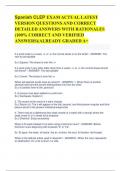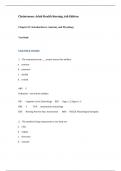Spanish CLEP EXAM ACTUAL LATEST VERSION QUESTIONS AND CORRECT DETAILED ANSWERS WITH RATI ONALES (100% CORRECT AND VERIFIED ANSWERS)|ALREADY GRADED A+ If a word ends in a vowel, -n, or -s, the normal stress is on the what? - ANSWER - The next to last syllable Ex.) Esposa - The stress is over the -o If a word ends in any other letter other than a vowel, -n, or -s, the normal stress should fall where? - ANSWER - The last syllable Ex.) Comer - The stress is over the -e When will spanish words have an accent? - ANSWER - 1. When there is another identical word and the accent distinguishes one from the other Ex.) el (article) from él (he, pronoun) 2. A pronoun has been added to a verb form Ex.) Explíquelo - Explain it 3. The accent is the result of a stem change Ex.) Reunir (ú) - The ú will appear in the first, second, and third person singular and third person plural of the present indicative/subjunctive 4. The re may be a diphthong (two weak vowels or a weak with a strong) where the weak vowel (u or i) needs to be stressed Ex.) Divertíos - Enjoy yourselves When is El used instead of La when using a feminine noun? - ANSWER - Before feminine nouns beginning with st ressed "a" or "ha". Ex: El agua - the water, el hacha - the ax, el alma - the soul, el hambre - the hunger. When is the definite article used in Spanish? - ANSWER - -When the noun represents an abstraction. Ex.) Life is short - La vida. -When the noun includes the totality of a category. Ex.) Man is mortal - El hombre. -With the days of the week (except after a form of the verb ser) and the seasons of the year. Ex.) - El lunes, La primavera. -With personal or professional forms of address in the third person: El señor Jiminez. It is committed when the individual is directly addressed and in front of titles such as Don. -With the parts of the body or articles of clothing instead of the possessive adjective. Ex.) I brushed my teeth - Me cepi lle los dientes. -With the names of languages except after en, de, and hablar. Ex.) El frances es dificil. -With weights and measures. Ex.) Un dollar la libra - One dollar per pound. -With infinitives used as nouns (gerunds). Ex.) Seeing is believing - Ver as creer. -With names of generic places. Ex.) Jail - La carcel. Class - La clase. -With family names. Ex.) The Garcia's, los Garcia. -With adjectives to make them nouns. Ex.) The pretty one - la bonita. The poor - los pobres. -With nouns in apposition w ith a pronoun. Ex.) We Americans - Nosotros los Americanos. What is the difference between de and dé? - ANSWER - De: Of, From Dé: Give - Formal Command What is the difference between se and sé? - ANSWER - Se: Reflexive Pronoun Sé: I know - Verb What is the difference between el and él? - ANSWER - El: Article Él: He - Pronoun What is the difference between tu and tú? - ANSWER - Tu: Yours - Possessive Adjective Tú: You - Pronoun What is the difference between mas and más? - ANSWER - Mas: But - Conjuncti on Más: More - Adverb What is the difference between si and sí? - ANSWER - Si: If Sí: Yes When does El contract to Al? - ANSWER - When the article follows the preposition a (a+el) and to del when the article follows the preposition de (de+el) How do you sa y "I brushed my teeth"? - ANSWER - Me cepillé los dientes How do you say "I put on my shirt"? - ANSWER - Me pusa la camisa How do you say "One dollar per pound"? - ANSWER - Un dólar la libra La is used because it has to do with weights and measures How do you say "The García's"? - ANSWER - Los García How do you say "We Americans"? - ANSWER - Nosotros los americanos When is the definite article committed in spanish? - ANSWER - -Gives a definition - Que es astronomia? -Uses estudiar or examinar - Estudiamos qui mica -With the expression de...a - de seis a ocho - from six to eight. -With expressions such as: Por primera vez - For the first time. Por segunda vez - For the second time. En primer lugar - In the first place. -With con and sin before an unmodified abstract noun. No puedo vivir sin libertad - I cannot live without liberty. -With a numeral that denotes the order of a monarch - Carlos Quinto - Charles the Fifth. How do you say "the important thing/part"? (Lo+adjecti ve= part/thing) - ANSWER - Lo importante. How do you say "the best thing/part"? (Lo+adjective= part/thing) - ANSWER - Lo mejor. How do you say "You don't know how important it is"? (Lo+adj/adv + que = how) - ANSWER - Tu no sabes lo importante que es. How d o you say "We'll cover everything we did yesterday"? (Lo de= All that or everything that (happened)) - ANSWER - Vamos a cubrir lo de ayer. How do you say "I understand everything"? (Lo is used in sentences with the pronoun todo as the direct object) - ANSW ER- Lo entiendo todo. How do you say "All that I heard isn't true"? (Todo lo que= All that) - ANSWER - Todo lo que oi no es verdad. How do you say "Perhaps I seem it, but I'm not"? (Lo is used as a complement to replace adjectives, pronouns, or nouns with ser, estar, and parecer) - ANSWER - Quizás lo parezca, pero no lo estoy. When does Spanish omit the indefinite article? - ANSWER - -After the verb ser with nouns denoting profession, religion, or nationality except when the noun is followed by an adjective or some other modifier. Ex.) Soy profesor, son catolicos, es espanola. Soy un profesor exigente - I'm a demanding teacher. -With words such as otro, medio (half), cien (one hundred), mil (one thousand), tal (such a), cierto (a certain), que (what a). Ex.) a certain woman - cierta mujer, cien libros - a hundred books. -After sin. Ex.) Salio sin abrigo - He left without a coat. -After haber used impersonally, buscar, and tener. Ex.) No hay repuesta - There isn't an answer. Estoy buscando trabajo - I'm looking f or a job. Most nouns ending in what are masculine? - ANSWER - -o, -or Most nouns ending in what are feminine? - ANSWER - -a, -d, -ion, -umbre, -ie, -sis, -itis Name a few common words ending in -o that are actually feminine. - ANSWER - La mano, la foto, la moto (motorcycle) Name some common masculine words that end in -a. - ANSWER - El clima - climate El diploma - diploma El drama - drama El poema - poem El tema - them e El problema - problem El sistema - system El mapa - map El profeta - prophet El aroma - aroma El rey - ANSWER - The King El reina - ANSWER - The Queen El poeta - ANSWER - Poet (man poet) La poetista - ANSWER - Poet (woman poet) El gallo - ANSWER - The rooster La gallina - ANSWER - The hen El yerno - ANSWER - The son -in-law






